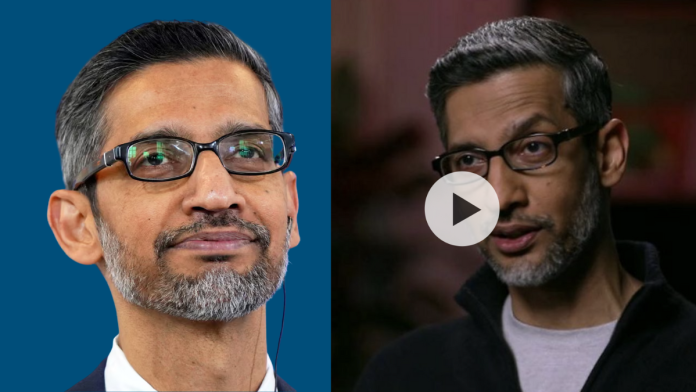If you use AI tools every day, this might surprise you. The person running one of the biggest AI companies in the world is telling you to be more careful with them. Alphabet Chief Executive Sundar Pichai recently spoke in an interview with the BBC, where he warned that people should not blindly trust everything artificial intelligence tools tell them.
His comments were later unpacked in more detail by The Guardian, which highlighted his key message very clearly. AI is powerful, useful and impressive, but it is still prone to errors, and users need to keep their judgment switched on.
For a technology that is rapidly being woven into search, creativity, research and even business strategy, this is a serious reality check.
Also Read: Jeff Bezos Launches $6.2B AI Startup ‘Project Prometheus’ in Major Industry Shake-Up
Don’t blindly trust what AI tells you – Sundar Pichai
In that BBC interview, Sundar Pichai explained that even the most advanced AI models are still “prone to errors.” He said that people have to learn to use these tools for what they are good at and not blindly trust everything they say.
If you have ever seen an AI confidently give a wrong answer, you already know what he means. The reply looks polished, sounds knowledgeable, and feels reliable, yet the facts are off. Sundar Pichai is basically telling the world that confidence from an AI model does not equal truth.
The Guardian report on his comments pointed out that this issue is especially important now that Google has integrated its Gemini chatbot into search as an “AI mode,” giving users answers that feel like a conversation with an expert. That expert tone can easily mislead people into thinking the answer is always correct. The Guardian
Why Sundar Pichai’s Warning Matters for You
Sundar Pichai is not just any commentator. He runs Alphabet, the parent company of Google and DeepMind, and is right in the middle of the global AI race. When someone with that level of visibility says AI models should not be blindly trusted, it is worth paying attention.
There are a few reasons his warning carries weight:
First, the scale of AI adoption is huge. Millions of people now use AI to draft messages, summarise complex topics and make decisions. If even a small percentage of those outputs are wrong, the impact is enormous.
Second, AI can make mistakes that look convincing. Sundar Pichai is urging people to treat AI outputs as helpful suggestions, not as final answers carved in stone.
Third, there is a wider economic layer. In the interview with the BBC, Sundar Pichai warned that if there is an AI investment bubble, “no company is going to be immune,” including Google itself.
So his message is not only about tool accuracy, but also about market expectations and long term trust in the technology.
A More Human Way to Use AI
One of the most interesting things about Sundar Pichai’s comments is how balanced they are. He is not attacking AI, and he is not defending it blindly either. Instead, he is calling for a more human approach.
Sundar Pichai wants people to use AI alongside other tools, not as a replacement for them. That means combining AI suggestions with traditional search, trusted sources, and your own experience.
In other words, AI should be your smart assistant, not your unquestioned decision maker.
From a reader’s perspective, this makes sense. We have been here before with other technologies. The early internet was hailed as a pure force for knowledge, social media as a pure force for connection. Over time, we discovered the risks and learned to use them with more nuance. Sundar Pichai is encouraging that nuance with AI now, before blind trust turns into bigger problems.
Practical Ways to Use AI More Safely
So how do you put Sundar Pichai’s advice into practice in your daily life or your business?
1. Treat AI responses as a first draft
Let AI help you brainstorm, outline, and draft. Then step in as the editor. Check facts, adjust tone, add missing context. AI is fast and creative, but you are still responsible for the final result.
2. Double check anything important
When AI gives you information about money, health, contracts, or legal issues, do not stop there. Compare its answer with reliable sources, experts, or official websites. Sundar Pichai’s warning about errors is especially relevant in these sensitive areas.
3. Ask follow up questions
If something feels off, ask the AI to clarify or provide different angles. Pushing deeper often reveals uncertainties or gaps that a single answer might hide.
4. Understand the limits of the tool you use
Each AI system has its own training data, strengths and weaknesses. The way Google positions its Gemini model in search, the way other tools handle context, all of that matters. Sundar Pichai’s comments suggest that even at Alphabet’s level, there is a constant effort to balance power with responsibility.
5. Keep humans in the loop for big decisions
For hiring, strategic planning, legal matters, and health related choices, AI should assist, not decide. Use it to gather information and options, then let human judgment drive the final call.
The AI Bubble Question
The BBC interview did not only focus on the accuracy of AI tools. It also touched on the bigger economic picture. Sundar Pichai compared the current AI investment wave to previous bubbles. He acknowledged that while there is real substance, there are also “elements of irrationality” in the market.
This does not mean he thinks AI is overhyped as a technology. In fact, he has said that AI is likely to be as transformative as the internet itself. His concern is that if expectations run too far ahead of reality, a correction will come, and even big players will feel it.
For businesses, that is another reason to stay grounded. Build real value with AI, focus on practical use cases, and avoid chasing hype for its own sake.
The Future Is Still Bright, Just Not Automatic
Despite all these warnings, Sundar Pichai is one of the strongest believers in AI’s potential. He still talks about AI as a profound technology that can help people write, learn and solve complex problems faster than ever before.
His message is not “do not use AI.” His message is “use AI wisely.”
Use it to speed up your work, to explore new ideas, to make creativity more accessible. At the same time, keep your critical thinking, your curiosity and your skepticism alive. The best outcomes will not come from blindly trusting AI, but from working with it as a powerful partner while you stay firmly in charge.










